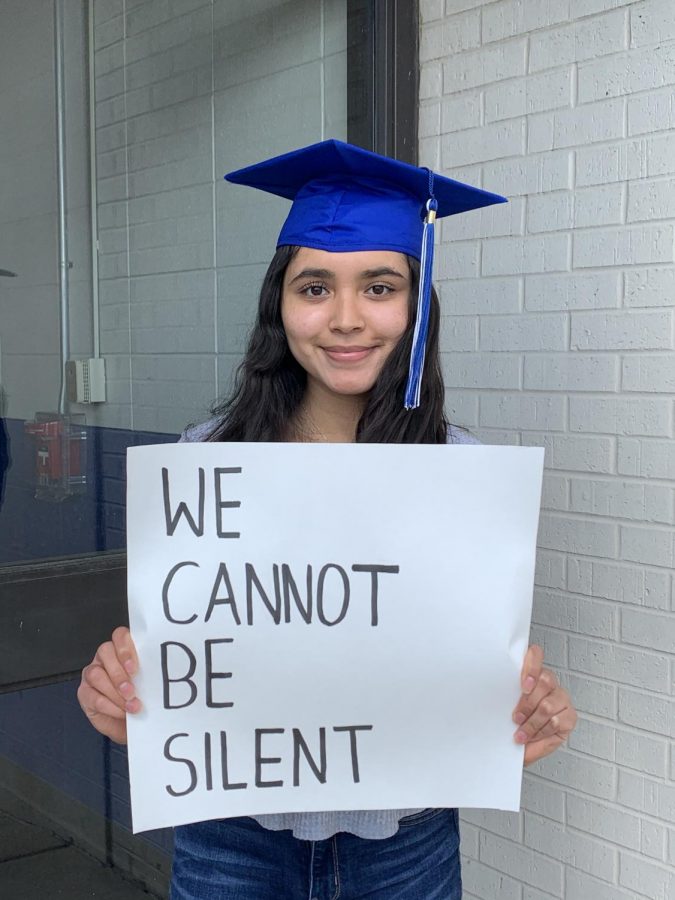Photo by Gurneer Sidhu
Melissa Rodriguez, senior, says that her experiences have allowed her to realize the importance of her voice
Her identity, her journey, her fight
Racism is about silencing victims. But when senior Melissa Rodriguez was told to ‘go back to her country’ at the age of nine, she says she discovered something that was waiting to be found: a voice.
“I would say [I found my voice] after that encounter because I noticed how my mom advocated for me, and that made me feel not so laid back when people were discriminating against me,” Rodriguez said. “She just pushed me to find my voice.”
Many know Rodriguez for being shy and quiet, but for those who are close to her, they understand that when it comes down to it, she will not hesitate to use her voice when it’s something she strongly believes in.
“She’s a shy person, but when it comes to things like [racism and prejudice], she knows when to use her voice and how to use it appropriately to speak up for things she believes in. And of course, [racism is] something she’s not going to let go of. If she hears something [racist] she’ll definitely be the person to stick up [to it],” Vivian Juarez, cousin of Rodriguez, said.
As a Latina woman, Rodriguez says advocating for racial justice and equality is a cause near and dear to her heart.
“It’s just so important to really have a voice because people are being downgraded to a very harsh extent, so I just thought, why not stand up for it?” Rodriguez explained.
Rodriguez says she has been trying to do her own part to make a change. When she’s not discussing current events with her family or finding organizations to donate to with her cousins, she’s attending Black Lives Matter protests, such as the one at Paulus Park in summer of 2020. Reflecting on it, Rodriguez says that the experience “was quite empowering, honestly, because everybody was just lifting each other up and were just like changing things to become equal.”
According to Rodriguez, despite the recent efforts made not just by her, but also by the LZ community, there are still barriers in achieving racial justice. An example is not realizing the presence racism still has in society.
“Something I don’t think people realize, especially living in a predominantly white area, how often [racism] occurs to people of color,” Juarez said.
With 79.7% of the LZHS population being white, according to the 2019-2020 Illinois Report Card, Rodriguez says she believes that the root of this problem is that “some people kind of push it away because it’s not affecting them, and they don’t see it as something that they really need to change. Whereas other people who are directly affected by [racism] know it exists because they felt it.”
Rodriguez herself shared a racist encounter she had with an older woman when she was a child in her personal college essay. She was in a store with her mother, and caused a shelf-full of stuffed animals falling to the floor. A woman came up to Rodriguez and told her that if she was going to be causing a commotion, she shouldn’t be doing it in this country. She was then told to go back to her country and “make a mess there.”
“I was so young. I didn’t really know what was going on. But as I got older, [some people] just [became] more subtle about it. [They were] still saying how I was like less of a person than they were. That’s just how it felt, like they were degrading me,” Rodriguez said.
Although Rodriquez says there are still barriers that must be overcome, her efforts in creating change and translating her beliefs into the real world have proven to be inspirational to her friends and family.
“I have learned from Melissa to stay true to who you are, be confident in yourself, and stand up for yourself and your beliefs,” Jelayne Clemens, senior, said.
And if there’s one thing Rodriguez wishes she could teach others, it’s that she wants them to understand that “they have a voice, they should use it, not just to stand up for themselves but others as well.”
